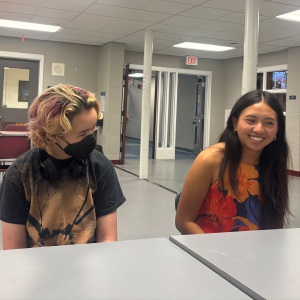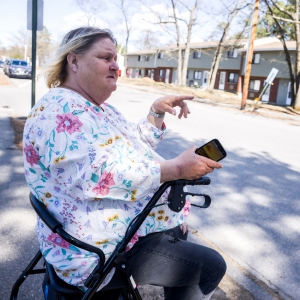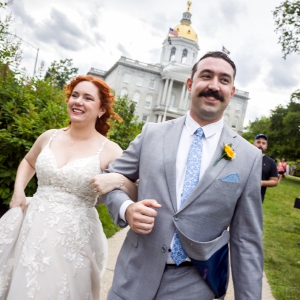On the day Kalahan Emery of Boscawen would have turned 21, his father toasted him with beers and tears.
| Published: 05-26-2022 4:30 PM |
On Oct. 9, 2019, a stranger from North Carolina named Carson McLean noticed a photo of Kraig Emery on a website.
Emery was raising a glass of beer, as though toasting someone. Shown alone, he wasn’t smiling, but he didn’t look mean, sad or angry, either. Sort of neutral. Under the circumstances, maybe that’s the best he could do.
The website for Sudden Unexplained Death in Childhood, or SUDC, told Emery’s story. He was paying tribute to his son, Kalahan Emery, who would have been 21 that day.
But on March 3, 2001, Kalahan took a nap and never woke up. That’s it. That’s the way SUDC, an illness that continues to baffle the medical community, operates. Children from 1 to 17, seemingly healthy, go to bed. Then they pass away.
Kalahan was 2½.
Since then, Kraig has participated in more drives than Tom Brady. He raises money and brings food to pantries. Always in the name of Kalahan, of course.
But what moved McLean more than anything was the role Kraig had undertaken – counseling fathers living the nightmare that Kraig knew all too well.
At the time, McLean’s own son, Frank, had recently died from SUDC. Frank was 23 months old. McLean needed a shoulder to lean on, someone who would really understand how he feels.
Article continues after...
Yesterday's Most Read Articles
 ‘Deep flavor’ – New restaurant in downtown Concord offers creative spin on comfort food and cocktails
‘Deep flavor’ – New restaurant in downtown Concord offers creative spin on comfort food and cocktails
 ‘Over-regulation is going to create sneakier kids’: Concord High students react to impending bell-to-bell phone ban
‘Over-regulation is going to create sneakier kids’: Concord High students react to impending bell-to-bell phone ban
 Royal Gardens tenants worried about where they will live after building renovations
Royal Gardens tenants worried about where they will live after building renovations
 Reclaiming Healy Park: A symbol of renewal and a reckoning with homelessness in Concord
Reclaiming Healy Park: A symbol of renewal and a reckoning with homelessness in Concord
 Concord receives federal funding to clean old stables, paving way for stagecoach museum
Concord receives federal funding to clean old stables, paving way for stagecoach museum
 Concord-area runners tackle Mt. Washington Road Race
Concord-area runners tackle Mt. Washington Road Race
He found it in Kraig, which is why McLean lobbied to add Kraig – a corrections supervisor at the Merrimack County House of Corrections in Boscawen – to our list of Hometown Heroes.
“He’s been in this (SUDC) club for 20 years now,” McLean, a financial consultant, said by phone from his home in Charlotte. “He’s paid it forward by working with dads like me. So now, I am working with another father who was in my situation. I do it because I was inspired by Kraig.”
Kraig is getting something from this bond as well, saying, “We talked and it can be therapeutic when you connect. That’s another person who knows about Kalahan. I hope and pray his story has impacted more people during his short life.”
Kraig led the drive to create the Kalahan Emery Memorial Trail at the Carter Hill Orchard in Concord, 1½ years after the death of his son. It’s about a mile long, lined with trees, a half-hour walk round-trip. There’s a small pond. It’s quiet.
“The reason I wanted to do a trail for him,” Kraig explained, “was because I had him in the trails most of the time. We were always hiking.”
Kalahan’s nickname was dragonfly. He’d speed ahead on a hike and turn on a dime, always exploring, always moving.
“I only had him for a couple years,” said Kraig, when asked to describe Kalahan. “He was full of energy, just very inquisitive. I’m sure it was something where he saw a pretty dragonfly and he’s off after it and that was it.”
Kraig said Kalahan loved to hike the trail that would later be named after him, especially in the fall, with all the foliage and color. He loved Matchbox cars and the movie “Toy Story.”
There was a warning, however, that something bad might have been on the horizon. In March of 2001, shortly before his death, Kalahan passed out in his car seat. He spent a few days in the hospital.
“They do all the tests you can do on a living person, didn’t find anything, then discharged him,” Kraig said. “I talked to him on a Sunday, that was the day he died. I told him I was going up north for a few days. I told him I would see him in a few days.”
That meeting never occurred. Kraig was in Weare, during a snowstorm, when his father called him, saying Kalahan had died. The boy never woke up from an afternoon nap. His aunt found him, unresponsive in bed.
Making matters worse, Kraig was snowed in for the night, unable to leave until the next morning. Then he drove for three hours, from Weare to Concord, just 15 miles apart.
“I couldn’t get home,” Kraig remembered. “The next time I saw him was at the funeral home. They brought him out so we could have a private moment. He had his pajamas on.”
Then, questions. Kraig said he called the state’s medical examiner nearly every day. He wanted to know how this killer killed.
“I just needed to know what happened, what happened, what happened,” Kraig said. “They never found a cause.”
At the time, in 2001, more was known about Sudden Infant Death Syndrome, or SIDS, than SUDC. SIDS claims the lives of babies less than 1-year-old, usually while they sleep. At least it had been recognized by then.
SUDC had not. By sheer coincidence, however, around the same time as Kalahan’s death, the spotlight began to shine on an illness eerily similar to SIDS. The age ranges of those affected were different. But the circumstances were the same.
That gave Kraig the opportunity to get involved with a new movement. He was on the ground floor of research and curiosity, the front line in a war against a shadowy enemy, a cousin of SIDS.
It’s a killer committing the perfect crime, leaving no evidence as to what happened. Just an acronym was left behind, on the SUDC website, which described the illness as “the most under-recognized medical mystery of our time.”
There’s never a firm diagnosis. In fact, there’s no diagnosis beyond those four letters strung together.
“It’s frustrating, like the medical community is fighting a ghost,” McLean said from North Carolina. “But it’s also a ghost because there’s very little public awareness. No one understands it.”
Right now, all that Kraig understands is that he and his son went on far too few hikes together. The encore performances of “Toy Story” are over as well.
So is the chance to do what Kraig had always wanted to do: take Kalahan to Fenway Park to see a Red Sox game. He had taken his six other children and Kalahan’s turn was fast approaching. Father and son took a preliminary trip, giving Kalahan a taste of what the family thought was on the horizon: A father taking his child to a Red Sox game. A New England tradition.
“I decided to drive down to Boston and just walk around the perimeter (of Fenway) with him,” Kraig said. “I have a few of those pictures. That was good.”
In the end, Kraig went to a Red Sox game during the 2001 season. He gave Kalahan’s ticket to his son’s favorite stuffed animal, Carrots the bunny. Fans nearby sought the significance of this unique pairing.
Said Kraig, “The people were like, ‘What’s that for?’ ”
He told them about Kalahan. A tragic ending, of course, but Kraig included his son’s love for hiking, “Toy Story” and Carrots.
“I’ve had a lot of memories come back the last few days,” Kraig said, “and not all of them were bad.”
His charitable work has paid off. For his own peace of mind as well as others’. Kraig grew up in Penacook, above a barbershop. Money was tight.
He knew what it felt like to need. And some people needed food, and they’d get it from a program with Kalahan’s named attached.
“After he died, I had to keep busy doing a lot of things in his name,” Kraig said.
Kraig planned that birthday toast for what would have been Kalahan’s 21st birthday with attention to detail, a clear plan in his head.
Go to an Irish pub (which he found in Gilford). Raise a glass of dark beer. Drink to the little boy who buzzed around like a dragonfly.
“I posted it on the SUDC social media site,” Kraig said. “(McLean) saw it and we started messaging each other.”
Their bond now is unmistakable. McLean’s appreciation for what Kraig has meant to him, what he did for him, is palpable.
“Kraig was there to listen and provide perspective when I needed it most,” McLean said by email. “He’s done this for folks in our community for years and he inspires others to do the same. Everyone needs something different when navigating grief. For myself and countless others, a peer support person like Kraig was part of that need.”
Kraig has lots of experience dealing with heartache. More than 20 years’ worth. It’s helped him reach out to others. People like Carson McLean, who remains in the early stages of his grief as he follows the light he sees in Kraig.
Kraig deflected the attention.
To Dragonfly.
“I feel like I can honor him,” Kraig said. “I feel like I’ve succeeded in that area. But hero is a big word, and I think Kalahan is the hero of this story.
“He has touched so many lives.”
]]>







 Photos: A Downtown ‘I Do’ at Market Days in Concord
Photos: A Downtown ‘I Do’ at Market Days in Concord Granite Geek: The circle of life is painful when watching the species-gets-killed part
Granite Geek: The circle of life is painful when watching the species-gets-killed part Concord’s two Rite Aid stores shutting soon
Concord’s two Rite Aid stores shutting soon
